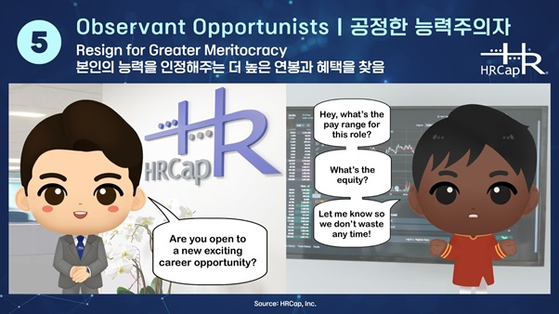[전문가 칼럼] 6가지 MZ세대 커리어 유형: (5) ‘공정한 능력주의자’
투명하고 공정한 보상 추구

스텔라 김 HRCap, Inc. 상무(Chief Marketing Officer)
‘열정적인 창업가’, ‘발전하는 학습인’, ‘성찰중인 이상주의자’와 ‘가치관 중심 동반자’에 이어 다섯 번째로 소개할 MZ세대 커리어 유형은 ‘공정한 능력주의자’(Observant Opportunists)다.
이들은 투명성과 공정성을 제일 중요시하는 MZ세대다. 이 유형의 인재들은 새로운 포지션으로 연락하면 ‘연봉과 보너스 등을 먼저 알려달라’고 하는 경우가 많다. 즉, 자신의 능력에 부합하는 보상이 아니면 애초에 고려하지 않겠다는 의미다.

HRCap, Inc.
이들은 왜 투명성과 공정성을 중요시할까. 입시·입사과정에서 치열한 경쟁을 경험하다보니 자연스레 시험기반 시스템에 익숙해진 탓일 수도 있으며, 디지털·AI로 급변하는 시대와 미래에 대한 불안을 극복하기 위해 투명성을 중시하는 것일 수도 있다. 커리어빌더에 따르면 MZ세대의 26%가 벌써 매달 생활비와 은퇴 걱정을 하고 있다고 한다. 이런 불안함을 극복하기 위해 본인들의 시장가치를 적극적으로 파악해 그에 합당한 대우를 받고자 하며, 평가 시스템도 투명성이 보장되기를 기대한다.
이미 많은 기업들이 인재에 대한 시장 경쟁력을 보장하기 위해 인플레이션 등 변수를 반영해 임금구조를 재조정하고 있는데, 업무성격별 성과급(보너스·커미션·스톡옵션 등) 보상도 추가해 인재확보 및 유지에 적극 나서고 있다. 다만, 이러한 보상 정책은 투명하게 적용되고 성과대비 결과가 예측이 가능해야만 공정한 능력주의자들이 회사정책에 동의하고 성과창출에 매진하게 될 것이다.
즉, 정확한 KPI(Key Performance Indicator, 핵심성과지표) 세팅을 통해 성과에 기반한 보너스를 제공해야 한다. 이들은 보너스 금액보다 예측 가능한 투명성과 평가기준을 더 중요하게 여길 것이다. 최근 미국 IT기업들과 한국 대기업들은 OKR(Objectives & Key Results, 목표·핵심결과지표)라는 새로운 성과관리 체계도 도입해 목표달성을 위한 구체적인 실행 방법을 함께 정하고 있다. 목표달성에 이르는 과정 자체도 중요하게 여기는 것이다.
마지막으로 성과리뷰는 수시로 해 빠른 피드백을 주는 것도 중요하다. 전통적으로 연말에 한 번 진행하는 회사들이 많았지만, 최근엔 일년에 두 번 혹은 분기마다 진행하는 경우도 많아졌다. 회사는 이런 평가를 통해 소통은 물론, 업무에 대한 개선점도 논의할 수 있으며 결과에 따라 발탁 등과 같은 승진의 기회도 더 많이 제공할 수 있다.
MZ세대는 높은 연봉과 다양한 혜택을 받아도 승진 기회가 명확하지 않다면 한 곳에 오래 머물 가능성이 낮다. 공정한 능력주의자에게 제일 중요한 것은 자신의 시장가치이기 때문에, 이들이 더 많은 책임감을 갖고 경력을 쌓을 수 있게 성장기회를 줘야 한다. 이들이 능력에 리더십까지 발휘하게 된다면, 기업도 더 발전하고 미래지향적으로 변화할 수 있을 것이다.
스텔라김
HRCap, Inc. 상무 (Chief Marketing Officer)
[Expert Column] 6 MZ Generation Career Categories: (5) ‘Observant Opportunists’’
Following the “Eager Entrepreneurs,” “Refined Reskillers,” “Introspective Idealists,” and “Principled Partners,” the fifth MZ Generation Career Category is the “Observant Opportunists.”
These are the MZ Generation employees who prioritize transparency and equity. When asked if they are open to consider a new job opportunity, many from this category respond by first asking about the pay range and bonuses. In other words, they will not waste time considering the position unless the compensation is in line with their skills and expectations.
Many MZ Generation employees firmly believe that organizations should recognize and reward accordingly. If they are not evaluated fairly nor rewarded transparently, the MZ generation employees feel at a disadvantage and express their dissatisfaction by leaving the company. According to Deloitte, 62% of employees prioritize higher salary, and 46% look for better benefits in their job search. CareerBuilder found that 24% of workers cite high salary and financial benefits as top reasons for staying at their current company.
Why does the MZ Generation value transparency and fairness? It may be the fierce competition of college admission and job search processes that made them naturally accustomed to test-based systems. Perhaps, they have come to value transparency to overcome anxiety about the uncertain future in a rapidly-changing digital world. According to CareerBuilder, 26% of MZ Generation name overall cost of living as their main concern and worry they may not be able to retire comfortably. As such, they actively assess their own market value and seek transparent evaluation of their ongoing performance and equitable reward for their merits and achievements.
To ensure market competitiveness for talent, many companies have already conducted company-wide salary adjustments by reflecting inflation, market rate, and other variables. They have designed competitive performance-based variable salaries (bonuses, commissions, and stock options) to actively attract and retain talent. However, the compensation programs must be transparent and predictable for the Observant Opportunists to align with the company’s policies and be motivated to drive results.
Therefore, organizations must strategically align and set Key Performance Indicators (KPIs) that are tied to performance bonuses. For some, it’s not just the bonus amount that matters but the projection, calculation, and evaluation that allows them to feel engaged and rewarded. Recently, U.S. tech companies and Korean conglomerates have also introduced a new performance management system called Objectives & Key Results (OKR), which starts with actionable goal-setting to achieve milestones. Here, the process becomes just as important as the outcome.
Lastly, companies must conduct frequent performance reviews to give prompt feedback. Traditionally, many companies conduct annual performance reviews once at the end of the year, but many have begun conducting them twice a year or every quarter. Frequent reviews drive greater communication and alignment, higher performance through proactive course-correction, and opportunities for growth and promotions.
The MZ Generation is unlikely to stay at one job for long if they do not see a clear path to promotion, even with a high salary and competitive benefits. Since the Observant Opportunists seek meritocracy and prioritize their market value, we must offer them greater responsibilities and advancement opportunities.
Only once these high-performing next-gen leaders learn to unlock greater leadership can organizations truly advance forward and meaningfully future-proof.
Stella H. Kim, SPHR
HRCap - Chief Marketing Officer & Global VP










with the Korea JoongAng Daily
To write comments, please log in to one of the accounts.
Standards Board Policy (0/250자)